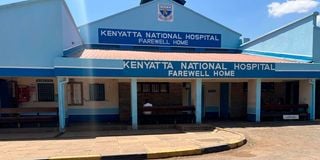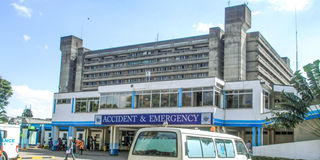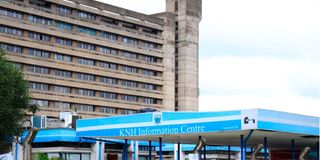Premium
A broken system: The death corridors of Kenyatta National Hospital

The farewell home at Kenyatta National Hospital. The referral facility does not offer grief counselling services to support the bereaved.
What you need to know:
- KNH does not offer grief counselling services to support the bereaved. Instead, they are directed to sit under a tree and two huge rocks outside the farewell home building so to breathe in and recollect themselves.
- "Sometimes I feel that the doctors here [KNH] just don't care, especially because many of us don't have money, so we're not a priority," complains a patient who has been at the referral facility for five months.
- In July this year, KNH announced the disposal of unclaimed bodies at the Kenyatta National Hospital Farewell Home. Kenya does not have any data bank for unclaimed bodies.
Also Read:
There is pin-drop silence along the dimly lit corridors of Kenyatta National Hospital (KNH) on a recent Friday afternoon, before 28-year-old Naomi Khavetsa lets out a scream that cuts through the air like a hot knife through butter.
Her beloved mother, who had been suffering from a severe migraine for the past three days, is no more.
With tears streaming down her cheeks, the young woman who hails from Kangemi, a slum on the outskirts of Nairobi and is now an orphan, tells me she feels that the doctors and nurses at East Africa’s biggest referral hospital could have done a lot more to save her mother’s life.
“We were here by 6am. We were told that the fee for medical consultation was Sh2,800, but we couldn’t afford it and so I was told to go look for the money. We have no hospital insurance because, to be honest, we are paupers,” Naomi says.
Her mother, a chang’aa brewer, had been toiling to feed the family after her father, a boda boda rider, succumbed to injuries at the same hospital, following a motorcycle accident.
So here she was, having tried to raise funds from friends and relatives, but came up short.
At some point, Naomi decided to take her mother back home, having failed to get the amount that was needed.
She had made the decision after sitting under the trees outside the referral facility, hopeful that even out there, her mother would miraculously recover from her illness.
But that was not to be.
As she put her mother on a taxi that evening, she felt, rather feared, that she was already dead.
But she also feared that she would be asked to pay a higher rate if she were to declare the real status of her mother to the taxi driver, and so she chose to do the journey home with her mother lifeless, but still warm.
“The painful images of my mother drifting away in my arms while I helplessly watched are now stuck with me forever,” Naomi told the Nation in an interview.
For three weeks, A Nation team has visited the national health facility to witness the goings-on, experience the service delivery from the eyes of Kenyans seeking services there.
The most heartrending place to visit, I was told, is the orthopaedic ward, which accommodates accident victims, mostly involved in boda boda accidents.
Boda boda, often known as the death traps on wheels on Kenyan roads, account for up to 60 per cent of accidents in the country.
At least 1,620 people died last year from motorcycle accidents. A total of 20,853 Kenyans were involved in accidents in the same year.
Here at the orthopaedic ward at KNH, the admitted patients suffered broken limbs, necks, and cracked skulls. Full bearded men are crawling on the floor without the lower part of their abdomens, while others are wreathing in pain with blood profusely oozing from what doctors managed to salvage of the remaining parts of their limbs.
For others, their limbs are strung up and are dangling in the air.
We meet John, who requests that we do not reveal his real name for fear of victimisation.
“Last night, one of us died here. His head was badly injured and skull cracked as a result of a motorbike accident. I think he got infected because they take very many hours before actually attending to us, cleaning and redressing and sometimes they miss doing it, we are just in the hands of God at this place,” he told me.
According to John, who has been admitted there for five months now, at least three patients die in a week since he got there due to excessive bleeding that is not attended to on time.
“Sometimes I feel the medics here just don’t care especially because many of us do not have money so we are not a priority.
“Some nurses are too harsh and unkind they will tell you things like ‘watu wa boda boda mnakuwanga na kiburi sana na matusi, ona sasa mahali kiburi imewafikisha.’”
For others, the bleeding and gaping of our wounds is just too much work.

The Accident and Emergency section of the Kenyatta National Hospital.
As I make my way towards the corridors leading to the wards at KNH, I bump into 40-year-old Patrick Kimathi.
“My expectant wife got sick and so I brought her here four days ago and today when I came this morning, they told me that the baby suddenly died in her womb,” Patrick narrates.
“I don’t know what happened, no one is giving a proper explanation. I need answers.”
As I enter the women’s ward with Patrick, most of the patients admitted in there are just alone by themselves.
I did not spot any nurse or medic for the 40 minutes I spent in there talking to patients.
“You will not see any of them until tomorrow morning when they come to do ward rounds and see perhaps who died in their sleep at night so that they contact the mortuary team. I have been here for the last four months because I am battling cancer and I owe a lot of money to the hospital, I see death every day along this ward corridor. No one really cares, they only prioritize attending to those who pay, money comes first before quality care,” Magdalene, a retired kindergarten teacher battling stage 4 cancer confides in me.
The retired teacher further discloses that medics at KNH lose interest in patients abandoned by their families and see them as a liability.
These patients, according to a KNH official I spoke to who is not authorised to speak to the media, make for a huge chunk of unclaimed bodies when they die.
“We accumulate up to 500 unclaimed bodies in a span of four months because patients are abandoned to die here mostly from various complications, accident victims, miscarriages, some are brought here after having attempted abortions that go wrong and they die. They are usually abandoned because their families cannot clear the medical bills and so they take off, forever and just leave them to die alone,” he explained, while adding that their capacity to accommodate all these dead bodies is limited.
In July last year, KNH announced the disposal of unclaimed bodies at the Kenyatta National Hospital Farewell Home.
Kenya does not have any data bank for unclaimed bodies.
According to the KNH notice, which was dated July 25, of the 233 unclaimed bodies, 125 were babies which also included four sets of twins.

Kenyatta National Hospital in Nairobi.
As I entered the farewell home, the smell of death was acrid.
A mixture of sour, putrid and lingering smell of rot and decay overwhelms the air.
A woman, who I later learn is called Dorcas Wairimu, dashes out as if stung by bees while wailing as two gentlemen with red teary eyes run after her, perhaps to help her come to terms with the fact that her firstborn, the son she has been frantically searching for the last one month, has been lying dead, unattended to and unclaimed on the cold floor of the mortuary at KNH.
KNH does not offer grief counselling services to support Kenyans like Dorcas. Instead, they are directed to sit under a tree and two huge rocks outside the farewell home building so as to breathe in and recollect themselves.
As we deliberated on whether to go inside the morgue, Brian Mwendwa (32), who hails from Kibwezi tapped me on the shoulder.
“You could come in with me and help me find my sister, she has been mentally well, I received reports that she was rushed to KNH but died while waiting to be attended to,” he tells me.
We find a woman, the mortuary attendant having fried rice and chicken for lunch right next to a pile of dead bodies that are on the floor and oozing some green substance that looks like pus.
The sight of dead bodies is horrifying, some still oozing blood, others with brains scattered on the floor all because the refrigerated drawers are full to the brim.
For the attendant, it’s just another day in the office.
She advises us to go to another office and first establish if the person we are looking for is recorded on a handwritten list they keep.
When we get back after confirming that the lifeless body of Brian’s sister was brought there, we begin the work of moving the dead bodies with our hands as we search for the woman who always took good care of my new friend.
The mortuary attendant shocked us when she said that she does not have any rubber gloves for the over 100 other people taking turns to each enter and search for their dead, unidentified loved ones.
She however pointed us to a tap and diluted liquid soap placed at the entrance which she said we could use to wash our hands after we were done.
The painful screams of anguish and heartbreak that filled the air at the farewell home kept rising, the sombre mood kept intensifying as more people identified their loved ones and tried their best to process and come to terms with how they died.
The number of dead babies indeed overwhelmed me as I counted 14 parents, who each identified their dead children aged three to 16 in the three hours we were there.
I learned that of the 14 children, 10 died while either waiting for or being treated after being admitted at KNH.
A male mortuary attendant is busy cleaning the bodies that have been identified and whose mortuary fees have been paid in full.
He tells us that mortuary attendants at KNH will never touch let alone clean a dead body whose fees have not been settled.
“Once you identify your sister’s body let me know so that I come pick it, clean it up and prepare it once you have settled the bill,” he insists.
We comb through bodies of dead Kenyans from all walks of life, shapes and heights for one hour until Brian spots a mark he said the sister had on her chin.
She was so badly hit during the accident that the impact almost took her head off her shoulders.
The young man gets hysterical, perhaps processing the kind of pain his sister went through.
He is in so much pain and sobs uncontrollably as the mortuary attendant shows up to keep his end of the promise.
We thoroughly wash our hands with soap then sit outside under a tree like the other bereaved families we met as my new friend wandered away in thought before finally summoning the energy to call his anxious mother to let the entire family know that he had found her at KNH, dead.
According to KNH, their farewell home fees include Sh470 for daily charges, a deposit of Sh5,700 for the general wing and Sh5,000 for post-mortems.
To transfer a body from the general wing to the private wing costs a deposit of Sh5,000, and a ten days’ package of Sh15,100, with every extra day going for Sh1,070.
Outside the KNH Farewell Home Chapel, a hearse business is thriving, perhaps giving Kenyans a quicker option to ferry their loved ones back home. Charges are negotiable, depending on the distance to be covered.
As I left the facility, Brian’s family had arrived ready to receive their loved one from the death corridors of KNH, may she rest well.
In an official response to the Nation via telephone a KNH official said that most Kenyans do not understand the fact that KNH is a ‘referral’ hospital that prioritises referral cases.
“I am not aware of the case involving the woman and her mother, I am sorry to hear.”
“We are usually very overwhelmed with cases that could be handled elsewhere by Level 1, 2 or 3 facilities. Most of the patients you see camping here day and night should learn that we prioritise referral cases sent to us from the other facilities around the country,” he said.
“Some caregivers and families who have failed to pay medical bills leave their sick loved ones to die here then disappear while in the cases of bodies of dead infants, most are as a result of women who try aborting at home and are brought here in a bad state during which they end up losing the baby, which explains the high number of unclaimed bodies,” the official told the Nation.
“The dead bodies pile up to a point we have nowhere to store them, which is why we always go to court and follow due procedure so that we are allowed to dispose of them. On the sanitation of our mortuary facilities, I will follow up with the team involved.”
Also Read:
Have you been frustrated while seeking government services? Would you like to share your story? Please get in touch with us at [email protected]. Use “Feedback” as the subject.





